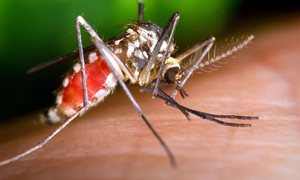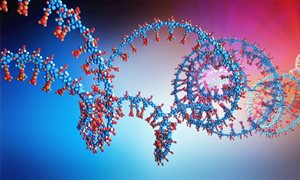
Today is World Malaria Day. The disease is still a major health problem worldwide, exacerbated by the corona pandemic. Researchers at Radboud University Medical Center developed a new drug that effectively kills the malaria parasite and blocks transmission of the parasite to the mosquito. The drug is ready for clinical trials in humans.
The global death toll from malaria declined for years until it stabilized at over 400,000 per year starting in 2015. Because of the corona pandemic, the death toll rose alarmingly to almost 630,000 in the year 2020. So the disease remains a major problem. Resistance arose to all front-line drugs. Therefore, the development of new drugs is still very important.
Making pills
Researchers at the Radboudumc have been working for years on new compounds that are active against malaria. Biologist Joost Schalkwijk stumbled years ago on old literature from the 1940s that said that compounds, similar to compounds that he was working on for skin diseases, could also be effective against malaria. He initiated further research into these compounds. The result: a new drug that works well, meets all the requirements, and is ready for testing in humans.
The drug was not immediately suitable for use against malaria. ‘We chemically modified it’, says molecular microbiologist Taco Kooij, theme Infectious diseases and global health, ‘the first version worked very well but was a liquid and therefore less suitable for medicine production. Of all the chemical variations we eventually selected the compound called MMV693183. This is a solid compound, making it possible to turn it into pills. The new variant also meets other requirements for use in humans, such as an easy preparation process and high efficacy with the expectation that a single dose will suffice.'
Mechanism of action
The substance is similar to pantothenate, or vitamin B5. Kooij: 'Our variant of this compound blocks the action of a crucial enzyme in the parasite. We have shown that our compound kills the malaria parasite very effectively in this way, both in animal models and on parasites that we have isolated from patients. In addition, the drug also blocks the transmission of parasites from humans to mosquitoes. So the drug has a dual effect and can thus prevent the spread of the parasite.'
During her PhD, Laura de Vries unraveled the exact mechanism of action of the new anti-malaria drug. ‘Using four different research methods, we showed that the compound interferes with a molecular process in the malaria parasite. As a result, the parasite is deficient in a substance that plays a central role in a variety of biological functions, such as fatty acids production and regulating the activity of proteins. These processes are crucial for survival’, explains De Vries. 'We also show that the drug does not work immediately, but is first converted into an active form in the parasite.'
Smart combination
This medicine is the first anti-malarial drug to intervene in this specific molecular process in the malaria parasite. ‘This is important news', explains Kooij. 'Because of resistance, it is good to disrupt a very different process in the malaria parasite than other anti-malarials do. I think we need to make a smart combination of our compound with other drugs. In addition, this drug has the advantage that it also blocks transmission to mosquitoes, so resistance is less easily spread.'
The drug has been developed preclinically and is ready for translation to patients. Kooij: 'The Malaria Medicine Venture is now developing the compound further and will set up clinical studies. They also own the patent. Hopefully this drug will have a place in the fight against malaria and we can reduce the number of deaths caused by malaria.’
More information
First author Laura de Vries received her doctorate cum laude on her dissertation in December 2021. In April 2022, she received the Westerdijk Award for best dissertation in medical microbiology. In addition, she received a Rubicon grant in April 2022, which allows her to continue her research on interactions between the malaria parasite and the mosquito at Harvard University in Boston.
This research was published in Nature Communications: Preclinical characterization and target validation of the antimalarial pantothenamide MMV693183. Laura E. de Vries, Patrick A. M. Jansen, Catalina Barcelo, Justin Munro, Julie M. J. Verhoef, Charisse Flerida A. Pasaje, Kelly Rubiano, Josefine Striepen, Nada Abla, Luuk Berning, Judith M. Bolscher, Claudia Demarta-Gatsi, Rob W. M. Henderson, Tonnie Huijs, Karin M. J. Koolen, Patrick K. Tumwebaze, Tomas Yeo, Anna C. C. Aguiar, Iñigo Angulo-Barturen, Alisje Churchyard, Jake Baum, Benigno Crespo Fernández, Aline Fuchs, Francisco-Javier Gamo, Rafael V. C. Guido, María Belén Jiménez-Diaz, Dhelio B. Pereira, Rosemary Rochford, Camille Roesch, Laura M. Sanz, Graham Trevitt, Benoit Witkowski, Sergio Wittlin, Roland A. Cooper, Philip J. Rosenthal, Robert W. Sauerwein, Joost Schalkwijk, Pedro H. H. Hermkens, Roger V. Bonnert, Brice Campo, David A. Fidock, Manuel Llinás, Jacquin C. Niles, Taco W. A. Kooij, Koen J. Dechering. DOI: 10.1038/s41467-022-29688-5.
-
Want to know more about these subjects? Click on the buttons below for more news.
More information
Annemarie Eek

wetenschapsvoorlichter
Related news items

Grants for research on magnesium deficiency and malaria Vidis for Felix Hol and Jeroen de Baaij
1 July 2022 Radboudumc researchers Jeroen de Baaij and Felix Hol both receive an NWO Vidi grant for their research, respectively on magnesium deficiency in type 2 diabetes and on malaria. go to page
Field research on malaria vaccine offers unexpected surprise
23 May 2022Field research on the effectiveness of a malaria vaccine, came up with unexpected results for an international group of researchers including Benjamin Mordmüller of Radboudumc. The vaccine evokes a broader response against malaria proteins than there are in the vaccine.
go to page
Rubicon grants awarded to three RIMLS researchers
19 April 2022Three researchers have received Rubicon funding from NWO/ZonMw. This will enable Elke Muntjewerff, Laura de Vries and Laurens van de Wiel to do research at a foreign research institute for the next two years.
go to page
Neolithic made us taller and more intelligent, but more prone to heart disease How modern European populations have evolved over the past 50,000 years
6 April 2022 After the Neolithic, European populations showed an increase in height and intelligence, reduced skin pigmentation and increased risk of cardiovascular disease due to genetic changes that lowered concentrations of 'good' HDL cholesterol. go to page

